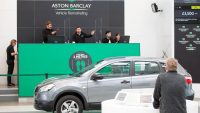More than eight out of 10 drivers are considering buying an electric or hybrid car, according to new research commissioned by heycar.
We looked into the habits of 4,130 drivers and asked them what car they were considering for their next vehicle.
A total of 3,427 (83 per cent) said they’d consider either a full electric, plug-in hybrid electric or hybrid vehicle next.
‘This is the clearest indication yet that consumers are ready to make the switch to an electric vehicle,’ said Karen Hilton, chief commercial officer at heycar.
‘Dealers need to be ready to talk to customers about EVs, including having them charged up and ready for test drives, and offering information about grants and benefits. This is a golden opportunity for dealers to be the “hub” of the local EV community.’
Our study showed that the majority of drivers (52.1 per cent) clock up fewer than 20 miles a day. And 29.9 per cent covered between 21 and 40 miles a day.
Yet almost half (45.7 per cent) of respondents said concerns over range was one of the main things stopping them buying an EV.
That means 82 per cent of drivers could easily cover their journeys in something like a Nissan Leaf.
The Leaf, which is the UK’s best-selling EV, has an official range of 168 miles and can comfortably cover 120 miles a day.
Drivers were most likely to choose an EV because of the savings they provide on running costs.
Not only are electric cars cheaper to run than petrol or diesel, there are also savings to be made on vehicle tax, free congestion charge, access to low-emissions zones, and government grants to purchase an EV and install a home charger.
But the survey also showed that the majority of people were put off by the high cost of EVs, as well as concerns over range and the current charging infrastructure.
State of the electric nation
Almost all respondents highlighted the need for better education around electric vehicles.
In total, 77 per cent wanted better information when it came to charging points, while 41 per cent thought the environmental message could be better.
To address this issue, at heycar we are putting together an EV knowledge hub. It will include sections looking at different charging connectors, the available infrastructure, battery range, and servicing.
There will also be detailed information on the financial benefits – from government grants to free vehicle tax.
A 2018 study by Deloitte estimated that the market will reach a tipping point in 2022 – when the cost of ownership of a battery-electric vehicle is on a par with petrol and diesel, making an EV a realistic alternative for new car buyers.
But that could come sooner if the government introduces a ‘scrappage’ scheme for hybrids and EVs as part of a raft of economic stimulus packages post-pandemic.
Currently, sales of battery-only electric vehicles only account for 6.4 per cent of all new cars registered. But this figure has almost doubled from a market share of 3.4 per cent in 2019, according to figures from the Society of Motor Manufacturers and Traders.
Meanwhile, sales of plug-in hybrid vehicles have increased by 221.1 per cent from 910 in August 2019 to 2,922 in August 2020.
Taken together, the current market share of battery EV, plug-in hybrids, and hybrids stands at 16.1 per cent – up from 8.7 per cent in the same period last year. It’s an upward trend that will only accelerate.
But as our research indicates, the government may not have to wait until 2035 for drivers to make the switch to EVs.
- Car Dealer Mag issue 151 out now – Read it here
- Have you nominated yourself for a Used Car Award? – Do it here
- Join our breaking news WhatsApp group – Click here to join now
- Which is the best car manufacturer to represent? – Find out here



































